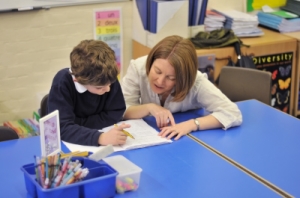When faced with a difficult assignment, do you give it your absolute best, or do you give up in despair after a few feeble attempts? It is well-known that intelligence is by far not the only determining factor in academic success. Moreover, it is not uncommon for talented children to be the first to give up on a challenge. Why are some people so reluctant to make any effort?
Helpless vs. Determined

A team of scientists from Stanford University pondered this very question back in the eighties. They observed the behaviour of a group of 11-year-olds asked to complete a series of problems. The first problems were doable, but the last four were designed to be too hard for the children to solve. As soon as the children started on the difficult problems, different behaviours emerged. Some children would get anxious and start fidgeting. They would make excuses or try to divert the conversation: “This is not really my thing.” Other children would try hard and get absorbed by the problem: “I’m almost there.” Mind you, there was no measurable difference in intelligence between the determined group and the helpless group. Up to the difficult problems, both groups had been doing equally well.
Their performance on the hard problems differed significantly though. There was a dichotomy in performance between the determined group and the helpless group, with few children scoring in between. Some determined children had even managed to solve some of the hard problems, while none of the helpless children had. The next question one could ask is, what caused half the children to behave so helplessly?
Fixed vs. Growth Mindset
The answer turns out to be a fixed mindset, as opposed to a growth mindset. People with a fixed mindset believe that intelligence is a fixed quality: you are born with a certain degree of it and this does not change. These people are generally unwilling to take up challenges, because failing might discredit their intelligence. This causes the helpless behaviour we saw in the 11-year-olds.
 People with a growth mindset are often more determined. They are aware that if they study hard, they can become smarter. Their perception of the world is not one in which they are subject to their innate intelligence. Instead, they can influence their intelligence through their own actions.
People with a growth mindset are often more determined. They are aware that if they study hard, they can become smarter. Their perception of the world is not one in which they are subject to their innate intelligence. Instead, they can influence their intelligence through their own actions.
As the performance difference between the two groups of 11-year-olds shows, mindset is a self-fulfilling prophecy. With a fixed mindset, at some point you will hit an obstacle that you cannot overcome while refusing to put in serious effort. With a growth mindset, you will be able to overcome many obstacles by applying strategy and trying hard. In the latter case, your intelligence might increase while in the first case it does not.
Unfortunately, the fixed mindset is ubiquitous and possibly reinforced within education to the detriment of society. This may be a factor in the underrepresentation of minorities in higher education and females in STEM. Fortunately, being aware of a fixed mindset brings you a long way in developing a growth mindset. Also, educators and parents can have a huge impact on by helping children develop a growth mindset. How exactly does one do that?
Remedies
Praise turns out to be a key factor. Most importantly, the nature of the praise. While people tend to praise children’s ability or intelligence, research shows that sort of praise is counterproductive. To help a child develop a growth mindset, one should praise its hard work, perseverance, learning from errors, and their improvement. One study observed mothers interacting with their one to three year old babies. The more a mother used ‘process praise’, the more likely a child was to have a growth mindset and a liking for challenge five years later.
The right kind of stimulation at a young age is most effective but it is never too late to start working on your mindset.
Interested? Also read:
Too Many Kids Quit Science Because They Don’t Think They’re Smart
Image courtesy of Paul Gooddy and stockimages at FreeDigitalPhotos.net